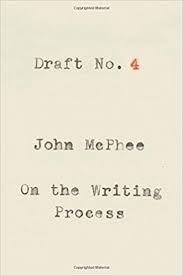
03 May Book Review of Draft No. 4: On the Writing Process
Draft No. 4: On the Writing Process – A Reflection
When I first picked up Draft No. 4: On the Writing Process by John McPhee, I was coming in almost completely blind. I had never been a reader of The New Yorker nor was I familiar with McPhee’s oeuvre. Gifted this book as a thoughtful holiday present, I was curious but unsure what to expect. Little did I know, it would speak to my inner writer and ignite a deep appreciation for the craft of nonfiction.
McPhee’s Draft No. 4 is less a step-by-step writing manual and more a series of essays reflecting on his decades of experience in the writing world. His candid exploration of topics like research, editing, and structure resembles an intimate conversation over coffee rather than a formal class. McPhee’s insights, as he puts it, stem from a simple philosophy: “I include what interests me and exclude what doesn’t interest me." This crude tool is a refreshing perspective in an era where content overload often clouds what truly matters.
One of the standout themes throughout the book is its structure—or rather, McPhee’s unconventional approach to it. In the chapter aptly titled “Structure,” I found myself both fascinated and amused by his architect-like diagrams, such as the seemingly cryptic A, B, C, D pattern related to his book, Encounters with the Archdruid. This kind of exploration opened my eyes to the nuances of writing structure that I had never considered. While I typically visualize writing as a simple arc, McPhee invites us to think of it as a complex, multifaceted design.
Though he shares wisdom like “omit, condense, search for the right word,” and grim observations about the trials of writer’s block, I noticed that this advice felt almost secondary to the engaging anecdotes that fill the book. Stories of interviewing Woody Allen or grappling with The New Yorker’s fact-checking department brought a sense of authenticity that resonated with me, making the lessons much more personal and relatable.
His voice is unpretentious yet deeply insightful, a quality reminiscent of E.B. White. There’s a warmth in McPhee’s tone that feels inviting, as if he’s encouraging you, not just to write but to foster a deep curiosity about the world. This is something I found refreshing amidst the often overly formal style of writing guides.
As I flipped the final pages, I realized that Draft No. 4 is not just for aspiring writers but for anyone with a curiosity about how stories are shaped. Readers who delight in nature, science, and the intricate tapestry of life will find plenty to engage with in McPhee’s world. Personally, I finished the book already anticipating my next venture into his work, particularly Annals of the Former World, and hoping some of his meticulous attention to storytelling has been absorbed into my own writing.
In a way, McPhee has reminded me that writing is both an art and a discipline, and it is worth the effort. If you find yourself drawn to the intricacies of storytelling or simply want to revel in the pleasure of good writing, Draft No. 4 is a treasure trove waiting to be discovered.
Discover more about Draft No. 4: On the Writing Process on GoodReads >>









